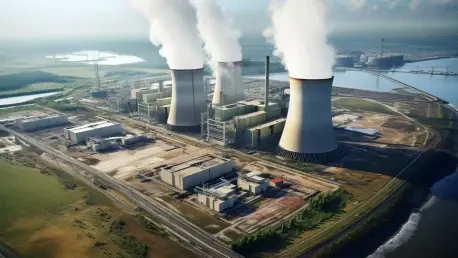The significant advancements in artificial intelligence (AI) have led to transformative changes in multiple industries. However, the remarkable uptake of AI technology comes with its own set of challenges, particularly the need for a stable and reliable energy source. As AI’s computational demands surge, the discussion has shifted toward the integration of nuclear energy as a complement to AI innovations. This convergence is becoming indispensable in empowering AI-intensive operations while maintaining sustainability.
Effective Merging of AI with Nuclear Energy
AI technology has marked its presence in the nuclear industry by enhancing safety protocols. The incorporation of AI for improved safety involves monitoring and analyzing complex data to prevent potential disasters, ensuring a safer work environment. AI algorithms are adept at identifying patterns and anomalies that might not be easily detected by human operators, thus reinforcing safety measures.
Another transformative aspect lies in AI-powered predictive maintenance, which has become crucial in nuclear facilities. By predicting equipment failures before they occur, AI-driven systems significantly reduce downtime and maintenance costs. Advanced algorithms analyze historical data to forewarn of possible breakdowns, aiding in prompt and effective maintenance strategies.
AI also optimizes operations within nuclear facilities by streamlining various processes. Automation powered by AI reduces the complexity and time consumed in procedural tasks, ultimately improving the efficiency and effectiveness of nuclear operations. This holistic AI integration promises further efficiency enhancements in nuclear power applications.
Cutting-edge Developments in AI and Nuclear
Recent technological trends indicate a growing interest in blending AI capabilities with nuclear energy. As AI algorithms become more sophisticated, their role in the nuclear sector expands considerably. Industry experts note a shift in consumer behavior, with more industries keen on leveraging AI’s advanced analytical capabilities to achieve higher operational standards.
Furthermore, innovations within this space are being driven by digital transformation trends. The push for clean energy solutions underscores the critical role AI algorithms play in enhancing the functional capacity of nuclear technologies. This development parallels the shifting needs of industries seeking resilient and eco-friendly energy solutions.
Implementations and Use Cases in Industry
The practical deployment of AI in nuclear operations sees applications in a range of industries, from healthcare to manufacturing. Numerous sectors have been integrating AI systems into their processes, reaping the benefits of enhanced precision and reliability. These implementations demonstrate the versatile nature of the AI-nuclear combination.
In particular, certain nuclear facilities serve as exemplary implementations of these innovations. The integrative technologies enable more streamlined operations and have led to heightened productivity and safety measures. Such successful use cases illustrate the promising potential for scaling these solutions across different domains.
Addressing Challenges and Constraints
Despite the promising outlook, the integration of AI in nuclear energy is not without its challenges. Technical limitations, such as data processing bottlenecks and regulatory hurdles, pose significant barriers. Current efforts are focused on overcoming these technical constraints through ongoing technological enhancements.
Regulatory bodies are also continuously working to adapt policies to accommodate these rapidly advancing innovations. By streamlining approval processes and establishing clear guidelines, regulators aim to promote a favorable environment that encourages technological growth without compromising safety standards or market stability.
Future Prospects and Innovative Pathways
The trajectory for the fusion of AI and nuclear energy looks promising. Emerging innovations are expected to transform both fields, paving the way for more efficient power generation and utilization. Anticipated breakthroughs in algorithm design and energy management hold the potential for groundbreaking advancements.
In the long term, the continued exploration of AI’s potential makes it likely that more robust applications will be developed, further alleviating energy challenges. These innovations may redefine how energy-intensive technologies are managed, ensuring AI’s progress aligns with sustainable development goals.
Summarizing Insights and Outlook
Throughout this review, the fusion of AI and nuclear energy has been demonstrated to significantly boost operational capabilities while addressing various challenges. By reinforcing safety measures and streamlining operations, AI applications have provided valuable enhancements to the nuclear energy sector. As efforts continue to overcome initial hurdles and optimize technological outcomes, the partnerships between AI and nuclear energy have laid the groundwork for advancing energy solutions that meet future demands.









